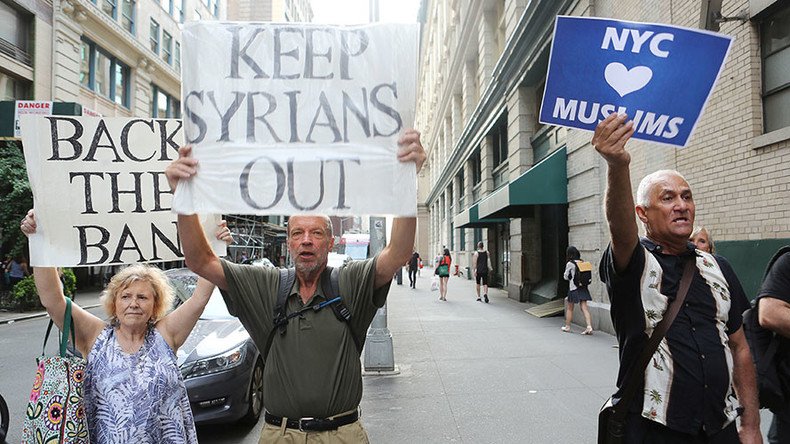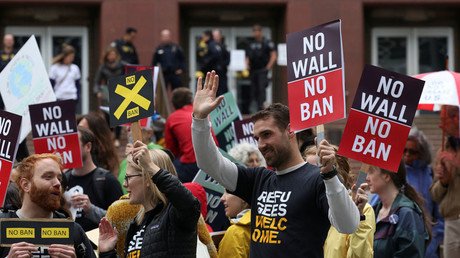Most Americans still support Trump’s limited travel ban – new poll

Six in ten American voters support the Trump administration’s new policy of denying entry into the US to people from six Muslim-majority countries, unless they can show a close relationship with someone in the United States, a new poll has found.
Some 37 percent of voters said they "strongly supported" the new guidelines issued by the US State Department that would deny visas to citizens of Iran, Libya, Syria, Somalia, Sudan and Yemen, while another 23 percent said they "somewhat supported" the guidelines. Only 28 percent opposed the measures, according to the poll results released by The Politico-Morning Consult Wednesday.
The survey was conducted after the US Supreme Court largely allowed the Trump administration’s proposed travel ban to go into effect last week with an exemption for those who have a "bona fide relationship" with a person or entity in the US.
A "bona fide relationship" is defined as “a close familial relationship” to qualify for the exemption, the court said. “As for entities, the relationship must be formal, documented, and formed in the ordinary course, rather than for the purpose of evading” the executive order. Such an entity could be an educational institution or a business that is hiring the foreign citizen.
"Since we last asked about Trump's travel ban, we've seen a drop in those who oppose the executive order," said Kyle Dropp, Morning Consult’s chief research officer and co-founder. "Though, we've also seen an uptick in those who do not have any opinion on the matter or have yet to settle on one."
In March, the Politico-Morning Consult asked voters whether they "approve or disapprove of a revised executive order that prohibits persons from six predominantly Muslim countries without visas from entering the United States for 90 days and halting the processing of refugees for 120 days." During that time, 56 percent of voters approved of the order while 33 percent disapproved.
A majority of Americans – six in ten – said protecting the country from security threats is the major reason behind President Trump’s executive travel order, according to a survey by The Associated Press-NORC Center for Public Affairs Research conducted June 8-11, 2017.
Surveys by Rasmussen Reports – in January and August of last year – showed similar results.
Statement from @POTUS on Today's Unanimous Supreme Court Decision. pic.twitter.com/0TuHoRJzuT
— Sean Spicer (@PressSec) June 26, 2017
The latest findings may have surprised some, considering the nationwide protests that were held after president Trump first announced the policy. A number of federal judges had blocked the enforcement of the president’s executive order, taking into account Trump’s campaign promise to seek a temporary, but "total and complete shutdown" of Muslims entering the United States.
Having temporarily allowed Trump’s travel ban with exemptions, the Supreme Court will nonetheless hear arguments about the president’s order during its next term starting in October.
Many who oppose the policy believe that it’s discriminatory on religious grounds. Others point to the fact that a number of countries whose citizens had carried out terrorist attacks in the US are not on the travel ban list – notably, Saudi Arabia.
As far as refugees are concerned, asylum seekers from all countries are barred from the US for the next four months.













